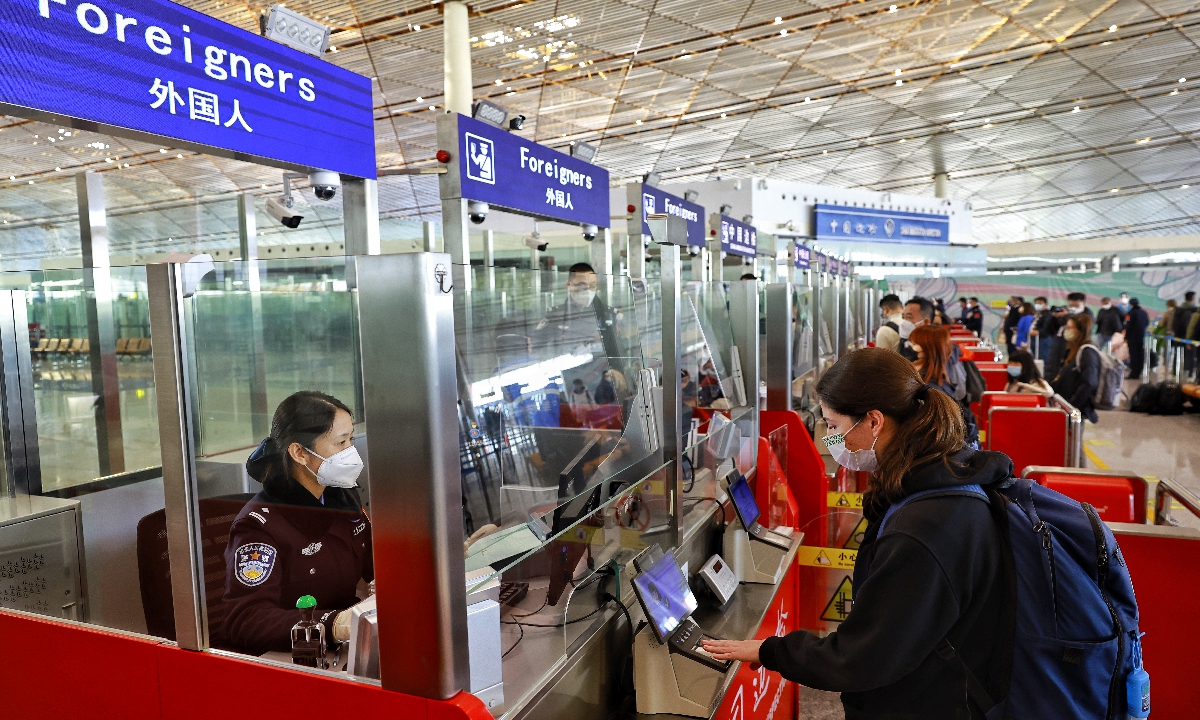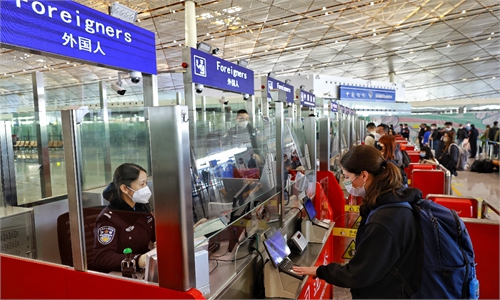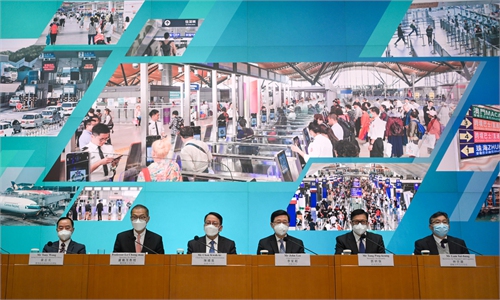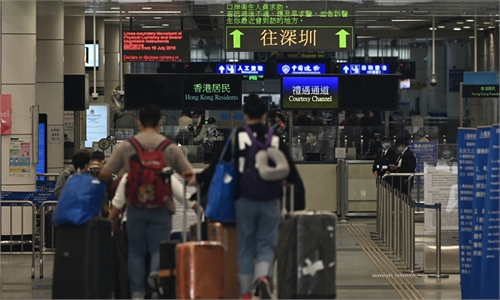This winter constitutes the best opportunity for major adjustments to COVID control policies in light of current conditions

Passengers line up at border checkpoints at Beijing Capital International Airport on January 8, 2022, as the airport welcomed international passengers on the first day China downgraded its COVID measures. Inbound travelers will no longer be tested for COVID-19 at the airport or be transferred to specific hotels for quarantine. Photo: Li Hao/GT
This winter is the best opportunity for the major optimizations and adjustments in COVID prevention and control policies and measures as vaccination rates among the elderly have risen to 80 percent and the virulence of Omicron has declined, a senior official from China's top health authority said in response to public's concerns over the surge in infections after China downgraded the management of COVID-19 on Sunday.
The downgrading of the management of COVID-19 from Class A to Class B was another major adjustment in the country's epidemic prevention and control after the country successively introduced 20 optimization measures and 10 new optimization measures from early December, 2022.
In response to public concerns over the major changes in epidemic prevention and control in such a short period of time, Liang Wannian, head of China's COVID-19 response expert panel under the National Health Commission (NHC) told CCTV News that the end of 2022 was the best opportunity for further optimization and adjustment in COVID policies and measures due to three changes in the epidemic prevention and control.
According to Liang, the virulence of the pathogen has decreased significantly and the level of active immunity of the whole Chinese population has improved significantly with vaccination rate of the elderly and the high-risk groups have reached a necessary threshold. The country has also prepared medical resources including medicines and treatment resources of critical cases. All these have contributed to the adjustments in the COVID policies and measures.
This adjustment is a voluntary action instead of a passive move since we have to deploy resources in the places where they are most needed to maximize their efficiency, to strike a balance between the epidemic prevention and control and the economic development since we have realized it is impossible to stop the spreading of the virus, especially the Omicron variant with such a strong transmissibility, Liang said.
Liang also noted that there have been several major changes after China downgraded the management of COVID-19, including turning from preventing infections to preventing severe illness, death and relying on the healthcare system, medical institutions to become the frontline of epidemic prevention, and key groups, institutions and units, especially the elderly becoming the priority of prevention and control.
According to Liang, the elderly will be the first to suffer if the epidemic spreads further according to the global data and the data disclosed by epidemic-hit countries and the WHO, as well as the domestic epidemic situation in China.
The decision to make the adjustment in winter is also a result from a comprehensive judgment out of consideration for the elderly, Liang said.
Despite that winter typically coinciding with a high incidence of respiratory tract infections, cardiovascular and cerebrovascular diseases, meaning the health of the elderly with underlying diseases will be threatened with the gradual lifting of various prevention and control measures, this current winter is still the best opportunity to make the changes since the virulence of Omicron variant has decreased, Liang said.
Meanwhile, in response to why the changes were not made in the summer in 2022, Liang said that experience learned from Hong Kong show that low vaccination rates amongst seniors contributed to a high mortality rate among this group. The vaccination rate among the elderly in the mainland have raised to over 80 percent now from less than 40 percent a few months ago, according to Liang, who noted that despite the protective efficiency of vaccination against severe illness and death is good, the protective effect of antibodies is limited.
Despite forecasting that the summer months in 2023, including June and July in 2023, will be a good season and likely to see fewer respiratory infections, protection from vaccination will be declining among the elderly at that time.
Whereas the summer in 2022 was not a good opportunity for the adjustment either due to the low vaccination rates among the elderly then and the booster shots did not reach expected levels.
In regards with the shortage of medical resources in coping with the surge in elderly patients in medical institutions, Liang said that such a situation is not often seen in China. The point is what measures should be taken to determine the priority of treatment and to implement hierarchical diagnosis and treatment in such a situation with limited resources.
In terms of the risk of imported COVID-19 cases after the downgrading of the management of COVID-19, especially the currently prevalent XBB variant in Europe and the US with a stronger immune escape capacity, Liang said that the subvariant of Omicron has been found in over 70 countries and regions, and there has been no discovery of apparent change in its overall virulence compared with other Omicron variants, despite of its possible increasing immune escape capacity according to the general principles of science.
Despite Liang, a public health expert, being unable to assure the public that Omicron subvariant XBB will not become prevalent in China, the majority of Chinese population that have just experienced peak infection, and will have immunity or resistance to the mutant strain over the near term, there is a slim chance for it to cause another surge in infections like the variant BF.7 has done in Beijing.
Liang also predicted that there will be a small chance that the Spring Festival travel rush will cause a second or third surge in infections since many provinces have reached or have passed the peak of infections, but attention should be given to rural areas with limited medical treatment capacity to assure timely treatment for seniors and other vulnerable groups.
Global Times



